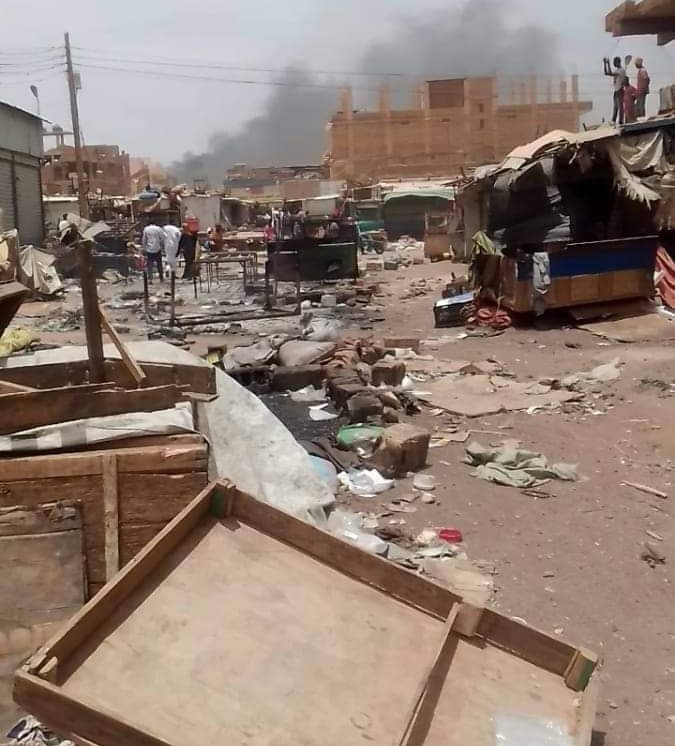Severe hunger threatens Sudanese in western Omdurman

The Libya Market in Omdurman after it was plundered in the first months after the outbreak of the war, July 20, 2013 (File photo: Social media)
The humanitarian situation in the vicinity of the Libya Market in western Omdurman has reportedly become extremely difficult. Those still living there are facing severe hunger. A Sudanese expert in international humanitarian law told Dabanga that starvation of the civilian population as a method of warfare constitutes a serious violation of the laws of war.
The area of the Libya Market has become completely empty of families, a young man told Dabanga yesterday.
“There are only men left who are guarding their homes against burglaries. There are also hardly any merchants left after the plundering last year. There are still some vendors working near the Libya Specialised Hospital west of the market, and that is all,” he explained.
The area is under control of the Rapid Support Forces (RSF). “There are no military confrontations, but we are witnessing shelling from time to time. The neighbourhoods west of the Libya Market are safe.”
He warned, however, that the people still living in western Omdurman are facing severe hunger. “The prices of food still available are more than soaring, while the people did earn any money for months.”
An activist reported to Dabanga in December from Jabarona, southwest of the Libya Market that many of the small shops in the neighbourhood, mostly populated by Nuba displaced in the 1990s and their children, were plundered by RSF soldiers. “When we want to buy food, we have to buy them for skyrocketing prices from these Janjaweed who are selling the stolen goods from their vehicles parked in the vicinity,” she complained.
Blackout
He added that the blackout of the communications networks has a significant impact on the lives of the people. “A number of people here depend on amounts sent to them from relatives or friends abroad, and this has become impossible since the networks were cut off nearly three weeks ago.”
Recently, Starlink satellite receivers have also arrived in the area, the source reported. “These devices have alleviated part of the suffering faced by us as a result of the communications outages.
Yesterday, the Jebel Awlia Emergency Room in southern Khartoum urged the international community and humanitarian aid organisations to pressure Sudan’s de facto government to restore internet and communications networks to all states, so that suspended vital relief efforts can go ahead.
Community kitchens set up by emergency rooms in various part of Khartoum state have had to stop operating because of the network blackout.
On Wednesday, the United Nations World Food Programme (WFP) warned that the vast majority of the people in Sudan are facing severe hunger, with more than five million unable to have one adequate meal per day.
Targeting of civilians
El Obeid Ahmed, former director of the UN Human Rights Training Centre in Doha and former representative of the Human Rights Council in Yemen, told Dabanga yesterday that the international humanitarian law (IHL), the international human rights law (IHRL) and the public international law (PIL) all prohibit the targeting of civilians directly or indiscriminately or as one of the types of sanctions imposed on civilians after being accused of collaborating with any of the warring parties.
Starvation of the civilian population as a method of warfare constitutes a serious violation of the laws and customs of war. This conduct has been prohibited under IHL since the adoption of two additional protocols in 1977 to the 1949 Geneva Conventions.
The IHL complements human rights norms on the right to adequate food, by prescribing certain conduct and prohibiting certain behaviour in order to prevent lack of food or denial of access to food in situations of armed conflict.
One of the law’s basic principles is that parties to an international armed conflict must at all times distinguish between the civilian population and combatants, and between civilian objects and military objectives, and must accordingly direct their operations only against military objectives.
The international human rights expert told Dabanga that there are very narrow and limited exceptions when civilians become combatants and thus can lose the protection afforded by international law. “A shining example of this case is the Sudanese Armed Forces’ (SAF) recruitment of civilians to participate in its war against the RSF.
“Furthermore, it is very clear from the situation in the Sudan that all parties to the conflict are engaged in acts that constitute a flagrant violation of civilian life and which could be prosecuted for war crimes and crimes against humanity, including genocide.”











 and then
and then